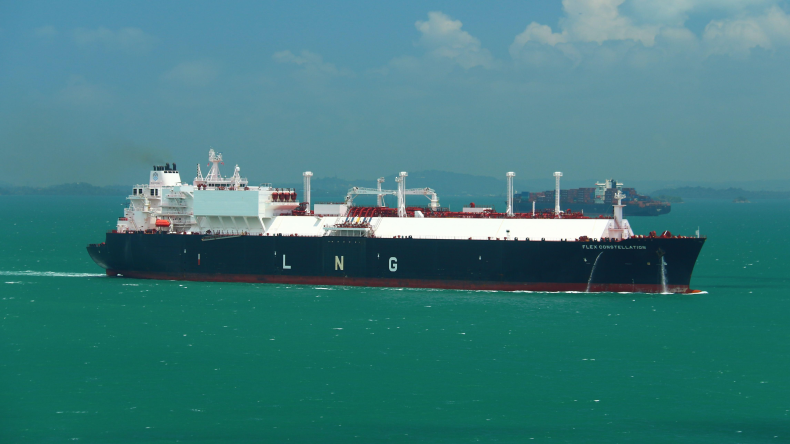BC LNG Projects: Are They Falling Behind? Status Update On 5 Key Developments

Table of Contents
LNG Canada Project: Progress and Potential Setbacks
LNG Canada, located in Kitimat, BC, is the most advanced LNG project currently underway. This massive undertaking involves the construction of a liquefaction plant with a projected export capacity of 14 million tonnes per annum (MTPA).
Current Status:
- Completion date projections: While initially slated for earlier completion, the project is currently targeting first LNG exports in 2025.
- Key milestones achieved and upcoming milestones: Significant progress has been made on construction, with major infrastructure components installed. Upcoming milestones include completing the final stages of construction and commissioning the plant.
- Challenges faced: The project has faced various challenges, including labor shortages, supply chain disruptions impacting the timely delivery of equipment, and navigating complex regulatory hurdles.
- Financial performance and investment updates: LNG Canada has secured substantial funding, but rising costs and potential delays could impact its overall financial performance.
Woodfibre LNG: A Closer Look at its Development
Woodfibre LNG, situated near Squamish, BC, is another significant project aiming to capitalize on the growing global demand for LNG. This project boasts a smaller scale compared to LNG Canada, with a planned export capacity of 2.1 MTPA.
Current Status:
- Financing secured and future funding needs: Woodfibre LNG has secured significant financing, but further funding may be required as the project progresses.
- Environmental approvals and potential challenges: The project has received most of its necessary environmental approvals, but ongoing monitoring and mitigation of potential environmental impacts are crucial.
- Expected operational start date and capacity: The project aims to commence operations in late 2027.
- Potential for expansion: Depending on market conditions, future expansion of the facility's export capacity is possible.
Coastal GasLink Pipeline: Essential Infrastructure for BC LNG
The Coastal GasLink pipeline is a crucial piece of infrastructure for BC's LNG industry, transporting natural gas from northeastern BC to LNG Canada's facility in Kitimat. Its completion is vital for the success of several LNG projects.
Current Status:
- Pipeline completion timeline: While facing significant delays and disruptions, the pipeline is nearing completion.
- Impact of Indigenous consultations and legal challenges: The project has faced considerable opposition from some Indigenous communities and lengthy legal battles, which have significantly impacted the construction timeline.
- Environmental considerations and mitigation strategies: The project's environmental impact has been a major point of contention, leading to the implementation of extensive mitigation strategies.
- Transportation and logistics aspects: The transportation and logistics involved in such a large-scale pipeline project are complex and contribute to the project's overall timeline.
Cedar LNG Project: Assessing its Viability
The Cedar LNG project, proposed for Prince Rupert, BC, is currently in the early stages of development. Its viability depends on a range of factors, including securing funding, navigating regulatory hurdles, and favorable market conditions.
Current Status:
- Status of permits and approvals: The project is still in the process of obtaining necessary permits and approvals.
- Market conditions and demand projections: The future success of the Cedar LNG project hinges on sustained global demand for LNG.
- Financial backing and investment decisions: Securing sufficient financial backing is a critical step for the project's advancement.
- Challenges and opportunities: The project faces the typical challenges associated with large-scale LNG projects, but there are also potential opportunities if market conditions remain favorable.
Pacific NorthWest LNG: A Project's Demise and Lessons Learned
The Pacific NorthWest LNG project, once a significant player in BC's LNG ambitions, was ultimately cancelled. Its failure offers valuable lessons for future projects.
Reasons for Cancellation:
- Market conditions and price fluctuations: Fluctuations in global LNG prices and a shift in market dynamics contributed to the project's cancellation.
- Regulatory hurdles and environmental concerns: Significant regulatory hurdles and environmental concerns made the project less financially viable.
- Financing challenges: Securing the necessary financing proved difficult, ultimately contributing to the project's demise.
- Lessons learned for future BC LNG projects: The project's cancellation highlights the importance of careful market analysis, navigating regulatory complexities effectively, and securing robust financial backing.
Conclusion: The Future of BC LNG Projects – Are Delays a Sign of Trouble?
The status of BC's LNG projects is a mixed bag. While LNG Canada is progressing, albeit with delays, other projects face significant challenges related to financing, environmental approvals, Indigenous consultation, and fluctuating global markets. The cancellation of Pacific NorthWest LNG serves as a stark reminder of the risks involved. While delays are apparent in some projects, the overall future of BC's LNG industry remains promising given the global demand. However, careful planning, proactive engagement with stakeholders, and a clear understanding of market dynamics are crucial for future success. Follow the latest updates on BC LNG project development to stay informed about this evolving landscape. Learn more about the challenges facing British Columbia's liquefied natural gas industry and its potential to become a major player in global energy markets.

Featured Posts
-
 Programma Tileoptikon Metadoseon Savvatoy 3 5
May 30, 2025
Programma Tileoptikon Metadoseon Savvatoy 3 5
May 30, 2025 -
 The Amber Heard Elon Musk Embryo Dispute New Developments
May 30, 2025
The Amber Heard Elon Musk Embryo Dispute New Developments
May 30, 2025 -
 Revealed Jon Joness Injury From Hasbulla Sparring Sessions
May 30, 2025
Revealed Jon Joness Injury From Hasbulla Sparring Sessions
May 30, 2025 -
 Telechargement De L Emission Integrale Europe 1 Soir 19 03 2025
May 30, 2025
Telechargement De L Emission Integrale Europe 1 Soir 19 03 2025
May 30, 2025 -
 Justica Para Bruno Fernandes A Busca Por Verdade E Justica
May 30, 2025
Justica Para Bruno Fernandes A Busca Por Verdade E Justica
May 30, 2025
